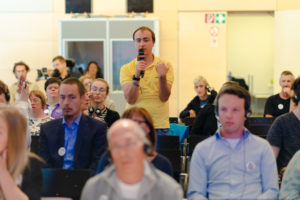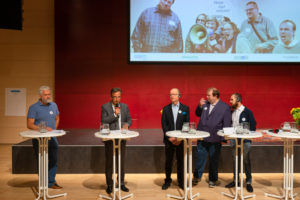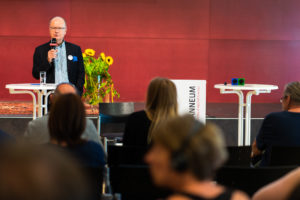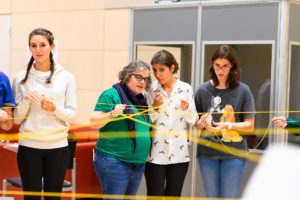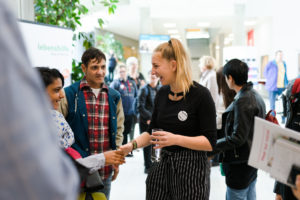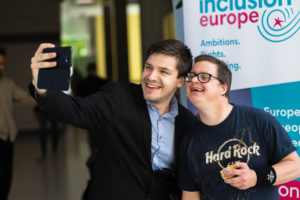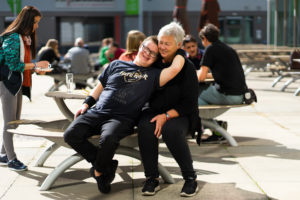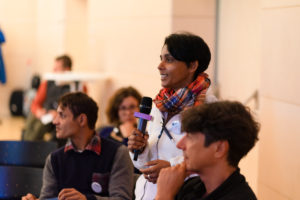150 self-advocates from 18 countries, countless positive encounters and 7 main demands: this is the result of the Hear our Voices conference for self-advocates, which happened in Graz (Austria) last week.
Upon invitation of Lebenshilfe Graz and the mayor of the city of Graz, self-advocates had come to discuss the right to vote and to be elected, and more broadly about speaking up, under the motto “My voice counts!”.
Workshops led by self-advocates threw light on different aspects of this theme:
While Elisabeta Moldovan from Romania spoke about her experiences growing up in institutions, and how she now uses her voice to help move people to the community, the Austrian Manuel Lankmair presented his study on “Elections and Party Platforms – can we access and use them?”. The results: None of the parties he examined had an accessible website, and only one had developed a party programme in easy-to-read language: “Parties still have a long way to go!”
It is incredible to share knowledge about self-advocacy groups from different countries. We are in the workshop with people from Croatia, Italy, Austria, Germany … @InclusionEurope @somfundacio #HoV19 pic.twitter.com/R31FZxO5NV
— Raúl Olivera (@twiterraul84) September 19, 2019
In contrast to this, self-advocate Antonio Hinojosa talked about a positive development: the case of Spain, where a successful campaign led to the opening up of voting rights for people under guardianship, granting 100,000 people the right to vote.
Belgian self-advocate Thibeau Bastien showed in his workshop “Inclusive employment: my work, talking to companies and to the Minister” how to reach out to politicians and business representatives to win them over for a cause.
Other workshop topics included “Claiming your rights”, “A report on political participation – how to know what is happening in your country?” or “The right to take part”.
@cllrsarapickard and Lazlo, chairperson for #EPSA @InclusionEurope Ready to change the world! #disabilityrights #HoV19 pic.twitter.com/UYgF0Mmsvm
— Gwendolyn Anslow (@AnslowGwen) September 19, 2019
Self-advocates running for office
There was one new development which particularly drew participant’s attention – the fact that more and more self-advocates are presenting themselves as candidates for elections. Xavier Orno from Spain was one of them: Alongside 12 other self-advocates, he ran for the Spanish municipal elections in May. At the conference, Xavier Orno talked about the knowledge he gained during his elections campaign, the support he received and the specific viewpoint people with disabilities can bring to party politics (“in most parties, they don’t know a lot about what is important to us”). He concluded: “I hope we can be an example for other self-advocates!”
The conference also saw a number of speeches by self-advocates, who reiterated observations which had been voiced at previous editions of the conference: Inclusion Europe’s current vice-president and president of the European Platform of Self-advocates (EPSA) László Bercse, for example, stressed that self-advocates want to be involved in the decisions that concern them. “We might need some support sometimes, but we are also able to help!” – for example with easy-to-read texts or questions about accessibility.
Former EPSA chair Senada Halilčević was very clear in her statement that “When you exclude us from voting you are sending the message that we are not equal citizens!”.
In Austria, all people with intellectual disabilities have the right to vote, according to Hanna Kamrat, member of the self-advocates’ advisory council and vice-president of Lebenshilfe Austria. Ways in which the insights of people with disabilities can be taken into account on the municipal level were presented both by the mayor of Graz, Siegfried Nagl, and Wolfgang Palle, commissioner for people with disabilities. Graz has an advisory council of people with disabilities, which provides its input on all issues concerning them. “Things really change as a result”, according to Wolfgang Palle. Graz also took part in a European project on employment for people with disabilities.
The conference conclusions reflected demands that self-advocates have been voicing for a long time, namely:
- voting rights for people under guardianship
- accessible information
- real jobs and fair pay
- self-determination and equal opportunities
- all institutions to be closed
- inclusion
Inclusion Europe will continue supporting self-advocates in their fight for this to come true everywhere in Europe. As another self-advocate said at the conference: “If you dare to speak up, inclusion happens!”
You can hear the wise words of Didier, self advocate from Belgium on why politics are important to achieve inclusion and how to improve the participation of self-advocates in political life. #HoV19 @InclusionEurope pic.twitter.com/CJAd3PRM91
— Guillaume jacquinot (@g_jacquinot) September 20, 2019
Further reading
- Read about the experiences of conference participants on Facebook and Twitter
- Special edition of “Europe for Us” for the conference in English, French, German, Hungarian, Italian, Portuguese, Romanian and Spanish
- Final conference messages in English, Czech, French, German, Hungarian, Italian, Polish, Portuguese and Spanish


